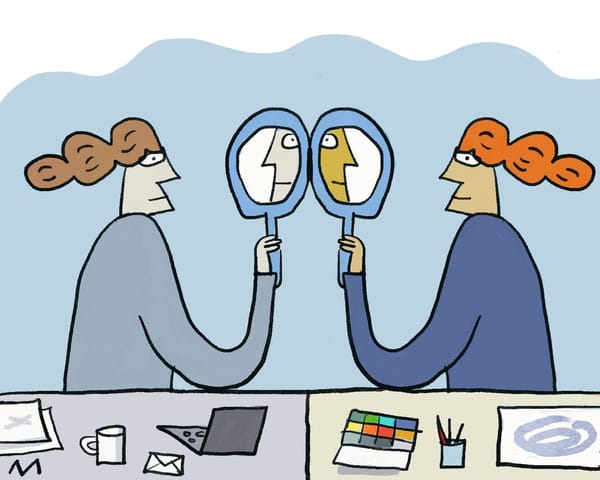Why Women Dislike Talking About Money. (And What We Can Do About It.)
Ultimately, it might not be about how much you make or how you spend, it's about how money makes you feel.

I don’t particularly enjoy talking about money. It’s not a revulsion. It’s more of an, “Oh, money. That subject again.”
Still, I am interested in exploring why we—and when I say we, I mean women, even high-earning women—tend to dislike talking about money. Is it because it’s boring? Stressful? Awkward? Is it a painful reminder that we’re not where we think we should be, financially speaking? Is that it evokes feelings of guilt and shame? Could it be all of the above?
The truth is that money is still very much a taboo topic. A 2024 Intuit survey found that 27% of women feel uncomfortable discussing money in social settings. Interestingly, this number rises among the Gen Z crowd with a full 34% saying they find it easier to discuss their sex life than their bank account.
Despite our silence on money, data from Ellevest, a women-focused investment platform co-founded by Sallie Krawcheck, suggests that we are very much thinking about it. A full 43% of women actively worry about money at least once per day, yet only 31% of women have met with a financial advisor, compared with 59% of men. And although women are likely to outlive men, men’s top financial priority is their retirement, while for women, it’s family. Ironic, no?
One thing holding women back from talking about money is a fear of being judged: Nearly one in three women, according to the Intuit study, worry that people will draw conclusions about their intelligence based on how they talk about money. For this worry, there’s a host of factors to thank, from self doubt to a lack of financial education to societal expectations.
Last month, when The Persistent hosted a conversation about money, our guests Claire Wasserman and Grace L. Williams weighed in on all these issues and more: relationships, financial problem-solving and self-reflection.
Claire Wasserman is the founder of Ladies Get Paid, a 55,000 member-strong community focused on financial psychology and redefining success and the author of the book of the same name. Grace L. Williams, a financial journalist, is the author of “Give Her Credit.”
Here are their takeaways; edited for clarity.
On our feelings about money
[Claire] With money, so many of us know that something is “not the right thing to do,” yet we still can't take action. Take shopping online in the middle of the night. We know not to do it, yet we can’t stop. What gets in the way, for many women, is what we saw happen in our family growing up, including things we were explicitly taught (or not taught) about money. So to start, it’s important to peel that back. If money is a tool, how was that tool used in your family? To wield power? To give to others? To bring comfort? It’s more about feelings. In some ways, it’s not really about the money at all.
On money and family
[Grace] My husband actually taught me how to understand and work with money. My parents did not educate me and he had a better relationship with the subject when he was younger.
Early in my career, for instance, he bailed me out of some serious credit card debt, which is not something I used to like putting out there. I think my discomfort stemmed from the feeling that I should have just learned it and done it on my own. I should have been born knowing it.
On realizing our worth…and sharing it
[Claire] In a capitalist society, it can feel like net worth equals self-worth in many ways. So we’d better get good at it, right?
I earned my first paycheck when I was 6 years old. I was in the Metropolitan Opera children's choir in New York City, where I also lived. And there was a lot of homelessness. I was walking down the street with the $20 I’d earned from singing burning a hole in my pocket. I just felt bad; I wanted to help solve the homelessness problem so I gave it away. For so many of us, there’s this idea that having money makes us greedy or feel guilty. I have never heard that from a man.

On how a budget can be liberating
[Claire] If you build a budget according to your goals and values, it’s an affirmation of those goals and values.
So when I say no to certain things, like the midnight impulse buy, instead of feeling like I’m depriving myself, I feel as if I'm saying yes— just to something else.
To get there, though, you first have to clarify your goals and values. And you have to factor a certain amount of freedom into your budget, so you can also say yes to yourself with total abundance.
Research shows that there are certain categories of spending that actually lead to more happiness, like experiences, which generate memories and good feelings that last longer than those we get from purchasing clothes. Of course, you can absolutely buy shoes and love them. But there are certain categories of spending that can make you happier.
On living without a budget
[Grace] I currently do not budget. I have tried and failed and I don’t have the discipline to see it through. But I agree with Claire that it can be fun and liberating to know exactly how much you have that you could enjoy. Because budgeting has to include enjoyment or what's the point?
Of course, back in the day when I only had a certain amount of money, I was forced to be resourceful and creative with money: If I only had $20 and I wanted to have a gathering with friends, I really tried to stretch that $20. Budget is not a dirty word, it's just one I have yet to really fully embrace.

On confronting money problems head on
[Claire] Money can be overwhelming, so breaking it down to its smallest components can help. Instead of looking at how much is coming in, look at how you are spending to see if you are living in alignment with your values. Think of it this way: If an anonymous person gave you the last three to six months of your credit card statement, could you describe that person? Could you get a sense of what they care about from what they're spending?
You might worry you have a lack of discipline, but the root of the issue is typically that we haven't identified the correct motivators for ourselves. When we do, we realize, “Oh my gosh, I'm good at this!”
On planning for the worst
[Claire] So you lose your job or you receive a huge medical bill. These experiences teach you that you have far less control over things than you thought that you did. And that can be very scary. (It’s also a good reason to put money away in an emergency fund.) But the reality is, you do have some control, which you can get at by asking yourself these questions:
–What can I control? Is there anything I have complete command of?
–What do I have the ability to influence or impact in some way? For example: I have the ability to pay $5 a month towards my debt. Or, I can email my boss and set some boundaries to gain some control over my time.
–What do I have no control over? It may be difficult to accept, but this is where you need to the things you can’t control, go. How do you accept it, even love it? This is where therapy can come in handy…
The answers to all three of these questions inevitably lead to more work, but they can also allow you to stop spinning your wheels and redirect your energy toward what you can control instead of what you can’t.

On talking about money in relationships
[Claire] The best way to approach talking about money may be to not even mention the word “money” but instead talk about how you were raised or the lifestyle you want to have or what’s important to you day to day.
In terms of a partner, look for the ability to communicate and an openness to discussing and figuring things out. It’s not whether or not you agree, because you could have totally compatible values, but be unable to communicate about it.
On asking for a higher salary
[Claire] First, I want everyone to stop using the word asking. It's not about asking. That sounds like it's a favor. You are pitching an investment opportunity, and you are the investment. When you get more money from your company, they are making more money off of you. So it's a completely different way of looking at it, for everybody involved.
Another way to think of it is, If I did not do this work, how screwed would they be? That’s when you realize, “Wow, I'm making a huge impact.”
On educating the younger generation
[Grace] I recently spoke at an all girls high school about my life and I asked the audience, How many of you understand finance? And essentially zero hands went up. And that killed me a little bit because they're going off to college and they still don't understand what a budget is. They don't understand their own credit. They don't understand money and that they're going to need it to live.
In the '70s and the '60s and the '50s, advertising targeted women specifically for so many things, including what family car you were going to pick off the lot, what home you were going to purchase as a couple. So women obviously were viewed as a huge financial influence. They just were not educated. And we still aren’t.
Francesca Donner is the founder and editor of The Persistent.








